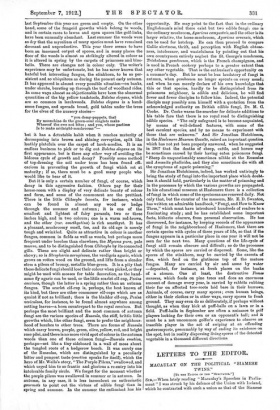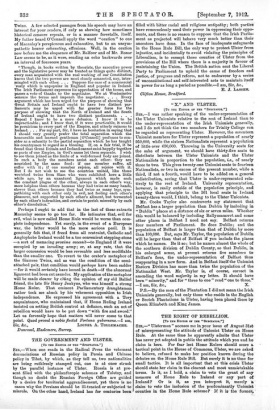LETTERS TO THE EDITOR.
MACAULAY ON THE POLITICAL "SIAMESE TWINS."
[TO THE EDITOR OF THE "SrEcraToa.1
Sin,—When lately reading " Macaulay's Speeches in Parlia- ment " I was struck by his defence of the Union with Ireland, which he contrasted with such a union as that of the Siamese
Twins. A few selected passages from his speech may have an interest for your readers, if only as showing how sometimes historical censure repeats, or in a manner forestalls, itself. My father heard O'Connell apply the word "oration" to one of Macaulay's perspicuous and exhaustive, but to an unsym- pathetic hearer exhausting, effusions. Well, in the oration now before me the eloquence of Mr. Balfour and of Mr. Bonar Law seems to be, as it were, sending an echo backwards over an interval of fourscore years.
"Though, in books written by theorists, the executive power and the legislative power may be treated as things quite distinct, every man acquainted with the real working of our Constitution knows that the two powers are most closely connected, nay, inter- mingled with each other. . . . Suppose the case of a commercial 'reaty which is unpopular in England and popular in Ireland. The Irish Parliament expresses its approbation of the terms, and passes a vote of thanks to the negotiator. We at Westminster censure the terms and impeach 'the negotiator. . . . Every argument which has been urged for the purpose of showing that Great Britain and Ireland ought to have two distinct par- liaments may be urged with far greater force for the purpose of showing that the North of Ireland and the South of Ireland ought to have two distinct parliaments. . . . Repeal I know to be a mere delusion. I know it to be impracticable ; and I know that, if it were practicable, it would be pernicious to every part of the Empire, and utterly ruinous to Ireland. . . . For my part, Sir, I have no hesitation in saying that I should very greatly prefer the total separation which the honourable and learned gentleman [O'Connell] professes to con- sider as a calamity to the partial separation which he has taught his countrymen to regard as a blessing. If, on a fair trial, it be found that Great Britain and Ireland cannot exist happily together as parts of one Empire, in God's name let them separate. I wish to see them joined as the limbs of a well-formed body are joined. In such a body the members assist each other: they are nourished by the same food : if one member suffer, all suffer with it ; if one member rejoice, all rejoice with it. But I do not wish to see the countries united, like those wretched twins from Siam who were exhibited here a little while ago, by an unnatural ligament which made each the constant plague of the other, always in each other's way, more helpless than others because they had twice as many hands, slower than others because they had twice as many legs, sym- pathizing with each other only in evil, not feeling each other's pleasures, not supported by each other's aliment, but tormented by each other's infirmities, and certain to perish miserably by each other's dissolution."
Perhaps I ought to add that in the last of these extracts Macaulay seems to go too far. He intimates that, evil for evil, what is now called Home Rule would be worse than com- plete independence. Yet surely, in the event of a European war, the latter would be the more serious periL It is generally felt that, if freed from all restraint, Catholic and Anglophobe Ireland would be a too convenient stepping-stone —a sort of menacing proxime accessit—to England if it were occupied by an invading army; or, at any rate, that the larger concession would be less revocable and less modifiable than the smaller one. To revert to the orator's metaphor of the Siamese Twins, sad as was the condition of the semi- attached pair, that condition would perhaps have been sadder —for it would certainly have issued in death—if the abnormal ligament had been cut asunder. My application of the metaphor will be made clearer by citing the opinion of my old Balliol friend, the late Sir Henry Jenkyns, who was himself a strong Home Ruler. That eminent Parliamentary draughtsman rather took me aback by his vehement opposition to Irish independence. He expressed his agreement with a Tory acquaintance, who maintained that, if Home Ruling Ireland insisted on setting British control at defiance, such an act of rebellion would have to be put down "with fire and sword." Let us fervently hope that matters will never come to that point. Quod procul a nobis flectat Fortuna gubernans.—I am, Sir, &c., LIONEL A. TOLLENACHE. Dunrozel, Haslemere, Surrey.







































 Previous page
Previous page